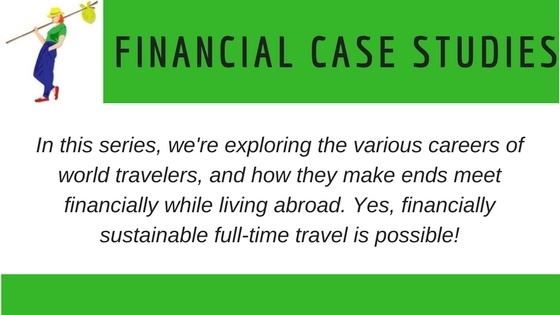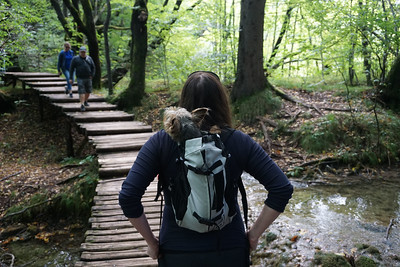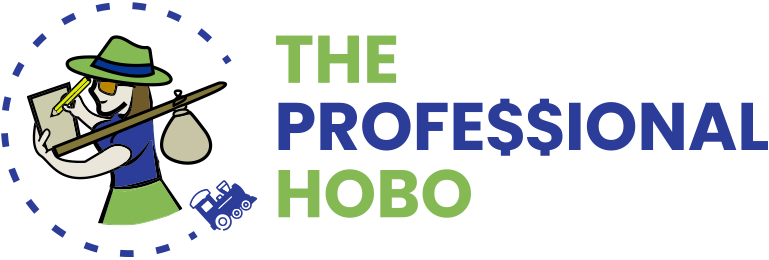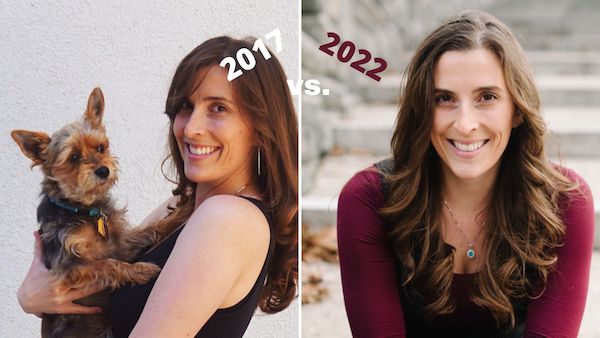Gigi Griffis is a world-traveling entrepreneur and writer/copywriter/content strategist with a special love for inspiring stories, new places, and living in the moment. In May 2012, she sold her stuff and took to the road with a growing business and a pint-sized pooch. She blogs at gigigriffis.com and has authored 11 unconventional travel guides.
She is also the author of the forthcoming novels The Empress and The Wicked Unseen.
This Financial Case Study was originally published in 2017. Since life happens while we’re busy making plans and Gigi’s life is no exception, I invited her to give us an update on her lifestyle, career, and income. This article juxtapositions her life in 2017 with her life in 2022. Fascinating stuff! Enjoy.

How long have you been living/working on the road, and where have you traveled to?
2017: I just celebrated my five-year anniversary of full-time travel, actually. It was late May 2012 that I locked up the door of my little white-picket-fence house in Denver for the last time and headed abroad. Since then, I’ve mostly been bouncing around Europe (the place I feel most charmed and most at home), though I’ve also spent some time in North and South America.
2022: I’ve just celebrated my 10-year anniversary of leaving the US! The last five years have been mostly spent in Europe (including stints in Estonia and Croatia on long-stay visas), and a couple months ago, I got approval for residence in Portugal, which will now be my home base.
Please describe what you do for income.
2017: In the last five years (and the 10 career years before that), I’ve actually done quite a few different things all centered around writing, strategy, and online marketing. I’ve been a full-time copywriter and content strategist, a travel guide author, a foreign correspondent for a travel magazine, etc.
These days, I am mostly a copywriter and content strategist. Basically, this means I plan for, create, and manage content for companies in the travel and tech industries. I write websites, brochures, billboards, and blog posts. I help clients plan blog content and understand how to connect with readers. Etc.
In a given month, copywriting and content strategist work makes up about 50 – 90% of my income and it’s what I usually lead with when people ask me what I do.
The other 10 – 50% comes from several different sources, including my 11 self-published, unusual travel guides, web consulting (helping clients build WordPress websites, understand SEO, etc.), my DIY Website Workshop (a new income source I launched this year: a seven-week course designed to help creatives and entrepreneurs launch a strategic, professional website), travel writing for magazines and websites, and the occasional tiny bit of affiliate income from my blog.
2022: In the last five years, I’ve primarily focused on content strategy and copywriting work for tech companies, while on the side I’ve been writing novels. This winter, I sold two of them, making fiction—for the first time—an income source for me.
My debut adult novel, The Empress, is novelization of the upcoming Netflix series about Sisi and Franz of Austria. My young adult debut, The Wicked Unseen, is set during the 1990s Satanic Panic and centers a creepy town and a creepier disappearance. The Empress comes out in October 2022 and The Wicked Unseen will hit bookshelves in summer 2023.
This year, I expect my income breakdown to be split about 50/50 between my fiction and my tech client work.
How many hours per week do you work on average?
2017: When I first started freelancing, I worked like crazy, probably anywhere from 40 to 80 hours per week. But now that I have six+ years of self-employment under my belt (and have had some serious stress-related illness), I try to keep my hours under 25 per week.
2022: Ten+ years into self-employment and full-time travel, my hours are pretty variable. This winter, I worked well over full-time hours in order to hit my novel deadlines and deliver client work. This quarter, to combat some of the burnout that schedule wrought, I actually plan to take time off from client work to travel, focus on language lessons, and work on my next novel.
How much money do you make?
2017: This varies pretty greatly month to month, but the average is somewhere around $3,000 per month right now. This year, my lowest month was about $1,100 (and, Murphy’s Law being what it is, that was also my highest spending month of the year) and my highest month this year has been just over $4,000 (and, irony at work again: it was my second lowest spending month).
2022: I’m thrilled to say that for the last couple years, I’ve broken into the low six figures! The more I embraced working with tech companies on long-term contracts, the higher I was able to raise my rates (getting up to $150 per hour last year).
This year is an odd one because I sold two novels and the way publishing pays is very different from contract work. Where my contract work is typically billed monthly and pays on a Net-30 payment schedule, publishing usually pays advances based on milestones. Every contract is different, but milestones might include:
- Upon signing your contract with the publisher
- The delivery of the first draft of the book
- Acceptance of the revised book by your editor (basically them saying “yes, this looks great and ready to go into production”)
- On publication of the book
In less-great contracts, some publishers are even trying to pay advances after publication (which is pretty ridiculous for something called an “advance” and meant to support you while you write and revise the book, but I digress).
So, all that to say that my monthly receipts are all over the place. I had a $35,000 month this year and an $86 month. I expect to make right around $100,000 total.
It is pretty cool to look back on the interview I did here five years ago and see that my highest-earning month back then was $4k. My income flow was steadier but much lower. I’m grateful for how things have shaken out.

Do you make enough money to support your lifestyle?
2017: Yes! My lifestyle is actually extremely affordable (I spend way less traveling than I ever did living in the States), so what I make is more than enough. My goal this year is to save about 50% of what I make (and when I say save, I mean the goal is that 50% will go into retirement and/or emergency funds). So far, I’m hovering just under the goal at about 49.5%.
Right now that extra money goes into high interest savings/checking accounts, but I’d like to put it to work for me a bit more and have been researching options for investing – just haven’t yet felt confident enough in my knowledge to pull the trigger. (See also: How to Manage Your Money: The Ultimate Guide to Financial Planning for Travelers)
2022: The answer is still a strong yes. But this year has been a bit trickier than usual because setting myself up for a home base is more expensive than traveling full-time (I’ve spent money on furniture, visa fees, electric company nonsense, etc.). I still expect to save a substantial portion of my income (my goal is 50%, which goes toward taxes and then into retirement and emergency funds).
Because I have a home base, I’m also (for the first time) planning to buy property, so some of the savings will be for an investment in a house or apartment.
What do you like most about your career and lifestyle?
2017: Freedom and creativity!
I have always loved both writing and problem solving and doing a mix of content strategies and writing projects means I get to do both on a regular basis. There’s something deeply creatively satisfying about helping a client find their voice, simplify their website, or take a complicated topic and make it simple enough for a non-technical reader to understand.
I also love that both writing and strategy force me to be constantly learning. In my career, I’ve written about everything from Belizean beach resorts to addiction to oil and gas regulations. Some of these topics are fun and light. Others are research-heavy. And I love how much I end up learning about topics I never would have researched or discovered on my own.
Finally, there’s the freedom. It was pure chance that I chose a career that I can do from anywhere and on any schedule, and I’m so glad I did. I love that I can create a schedule that highlights my most productive hours, gives me the freedom to take a break and get outside on a gorgeous day, and allows me to work from Paris one day, the Croatian coast the next.
2022: Same answer! I love the freedom and creativity of life on the road.
What are some of the challenges you have with this career and lifestyle?
2017: The only big ongoing challenge for me has been Wi-Fi. Getting to a new place and finding out the WiFi isn’t good can throw a serious wrench in my work-life. I’ve gotten better about this over the years (now I ask my Airbnb hosts to do a Wi-Fi speed test and send me the results), but it was incredibly frustrating those first few years. (See also: How to go Location Independent: The Ultimate Guide)
2022: I expect that finding the balance between having a home base and traveling to present some of its own challenges in the coming year or two since I’ve been so mobile for so long.
What is your vision for the future of your lifestyle on the road?
2017: Right now, my partner and I are thinking we’d like to have a home base in Europe and spend about six months per year in one spot while traveling the other six. So that’s probably in our near future. We’ll still be location independent and working fully remotely, but it is nice to have a place (or a couple of places) you love and come back to again and again.
Career-wise, I can’t imagine ever giving up on writing, though the types of writing I do are constantly shifting. In my spare time, I’ve actually been revisiting a childhood dream of mine and writing a novel. I’ll be really excited if I can take that passion project and turn it into an income source and possible career path as well.
2022: My plan here in Portugal is to stay in my home base about eight months per year (the required amount of time I need to stay in country to maintain my residence) and travel for the remaining four. This year, as I’m settling in, I won’t travel abroad quite as long, but will go traveling within Portugal to get a better sense of my new home.
Career-wise, I can’t imagine ever giving up on writing, though the types of writing I do are constantly shifting. Publishing is a fickle career path, but I’d be lying if I said my secret dream was anything less than writing novels and only novels.
I’ve been aiming for what they call barista-FI (where I have enough money to retire at 65 and only have to make enough to cover expenses until then, allowing me to work an extremely low number of hours per year and do just fine) and I’m hoping to hit that milestone by my early 40s (in a few years). If I sell another book this year, I might decide to move that timeline up. Only time will tell.
Any advice for the aspiring traveler about living and working on the road and managing finances?
2017: The most important thing to understand is that the principles that apply to saving and spending back “home” apply on the road. To live a financially sustainable life, you need to make more than you spend. And the bigger the gap between what you make and what you spend, the better.
That said, I think my biggest tip is to understand yourself. Know what you love. Know what you hate. Know what you need and what you don’t. If you need a quiet sunny space to work, don’t be afraid to put more of your budget toward finding the right apartments along the way. If where you live doesn’t impact you as much, but what you eat does, give your food budget the bigger boost. And if tourist attractions don’t thrill you, you can skip them and their entrance fees – even if everyone else thinks you “should” go up in the Eiffel Tower. Know yourself and spend your money accordingly.
2022: My previous answer still rings true for me even with double the time on the road.
Want more of Gigi? Waaaaay back in 2012, she wrote an entry for my Week-in-the-Life series, highlighting a week in her life in Belgium and Germany.



Understand yourself – so true! I love spending on food so I skip on staying at expensive hotels! luckily, there are a lot of affordable boutique hotels popping up everywhere 🙂